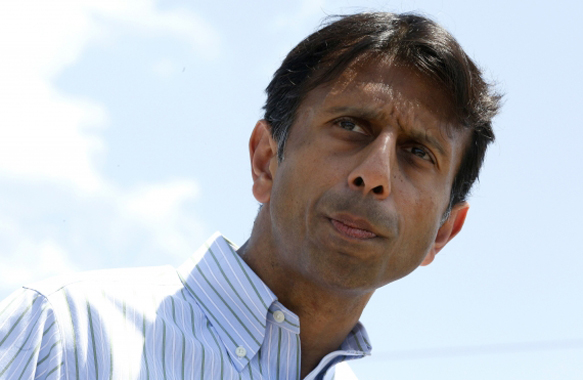Remember when the National Governors Association told us that Common Core was our friend? It was not that long ago. The year was 2010. Way back then a states-led effort to develop the Common Core State Standards was adopted. For near a year, state leaders, including governors and state commissioners of education from 48 states, two territories and the District of Columbia worked together to establish academic benchmarks. Louisiana, Governor Bobby Jindal was among them. And for a time, all was well. Jindal supported the plan created by Governors. Then, suddenly everything changed. Governor Jindal saw his public. The memorandum of understanding he signed in 2010 establishing that Louisiana would take part in Common Core and develop a multi-state test to measure student achievement was no longer his friend. His own push to strengthen the state’s commitment to Common Core definitely had to end. Today we cross the political bend…Governor Bobby Jindal’s commitment to Common Core is Gone with the Wind.
Louisiana Gov. Jindal Sues Feds, Says Common Core Violates States’ Rights
Louisiana Gov. Bobby Jindal filed a suit against the Obama administration Wednesday, joining a conservative-led effort to challenge controversial national education standards knows as the Common Core, which Jindal says violate states’ sovereignty.
“Common Core is the latest effort by big government disciples to strip away state rights and put Washington, D.C., in control of everything,” Jindal said in a statement.
Jindal names the U.S. Department of Education and Secretary of Education Arne Duncan in the suit, which argues that states are forced to cede their “sovereign authority over education policy to the federal government” to receive federal grants and police waivers linked to adoption of the standards.
The Common Core outlines skills and knowledge that public school students should acquire in each grade from kindergarten through high school and promote a deeper focus on critical thinking over rote memorization.
Jindal, who was once a proponent of the Common Core, has battled educators in his own state over the issue in recent weeks. He withdrew the state from the standards in June, but education advocacy groups sued and a state judge ruled last week that the Common Core would stand in Louisiana.
Jindal’s lawsuit comes as part of a campaign by conservatives to question the standards.
Last month, television personality Glenn Beck, who has recently published “Conform: Exposing the Truth About Common Core and Public Education,” held a two-hour simulcast in movie theaters across the country to criticize the standards. Indiana’s State Board of Education voted earlier this year to drop the Common Core. In June, South Carolina Gov. Nikki Haley signed a bill requiring her state to drop the Common Core for the 2015-16 school year. Soon after, Oklahoma also dropped the standards.
The Common Core has also become a significant issue among potential GOP presidential contenders, including Jindal. Wisconsin Gov. Scott Walker last month called on his state Legislature to repeal the Common Core, while New Jersey Gov. Chris Christie created a task force to study the standards.
Duncan criticized Jindal for his shift of opinion on this issue in an appearance last month on “CBS This Morning.”
“Gov. Jindal was a passionate supporter before he was against it,” Duncan said about Common Core. “That situation is about politics, it’s not about education.”
Common Core was implemented in states including California and Louisiana in 2010. States could choose whether to use the standards and give the tests affiliated with them. States that adopted Common Core were awarded extra points on their applications for Race to the Top funding. A handful of states, including Texas and Virginia, did not adopt the standards.
It is the promise of extra funding that Jindal says in the lawsuit coerces states into adopting the Common Core standards and “constitutes unlawful coercion that exceeds federal authority and violates the 10th Amendment,” the lawsuit says.
The suit also objects to waivers given out by the federal government that Jindal says allows states to waive certain requirements if they adopt the Common Core.
“What started as good state intentions has materialized into the federalization of education policy through federal economic incentives and duress,” the lawsuit says.
This type of lawsuit is not uncommon, said Ruthann Robson, a constitutional law professor at the City University of New York. Many were filed in the days after the Affordable Care Act was passed, arguing that the federal government forces states to adhere to its policies by taking away funding if they don’t. But these cases are hard to win, she said.
“Some justices, including
alana.semuels@latimes.com Twitter: @AlanaSemuels
Copyright © 2014, Los Angeles Times












Leave A Comment